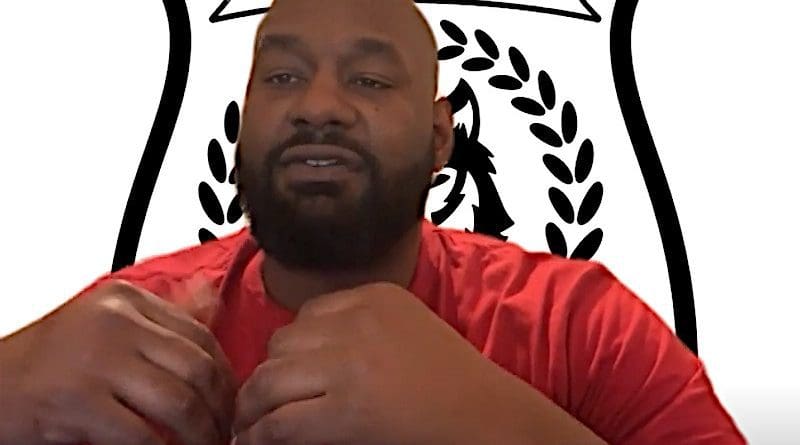Black Lives Matter’s Hawk Newsome Appalled By Lack Of Coverage Of Houthi Massacre Of Ethiopians
By Ray Hanania and Arab News
The horrific deaths of scores of Ethiopian migrants in a detention center in Sanaa run by Yemen’s Iran-backed Houthi militia is further proof that anti-black racism exists on every continent, according to Hawk Newsome, a founding member of Black Lives Matter (BLM) Greater New York.
Racial tensions and the deaths of black people in police custody have provoked repeated bouts of protest and unrest in the US and Europe in recent years.
Newsome played a key role in the worldwide movement that has rocked US cities since the police killing of African-American George Floyd in Minneapolis on May 25, 2020.
During an exclusive interview with Arab News, Newsome said the tragedy in Yemen demonstrates the need for global, pan-African solidarity — the kind espoused by the early-20th-century New York-based black nationalist Marcus Garvey.
“Racism is a worldwide practice. The demonization and vilification of black people takes place on every single continent,” Newsome said.
“So when we start talking about racism and anti-blackness, I tend to lean on the philosophies of Marcus Garvey, and I believe all black people should be unified in this struggle. Secondly, we should fight for all oppressed people.”
Hundreds of African migrants at a camp in the Houthi-occupied Yemeni capital were staging a hunger strike over maltreatment and poor conditions on March 7 when armed militiamen set their accommodation on fire, causing the deaths.
Newsome said he is shocked but not at all surprised that there has been so little outcry over the Houthi outrage. In his opinion, the response would have been entirely different had the victims been white.
“This is an issue that needs attention. This is something that can’t be ignored. This is something I won’t ignore. There are 44 people murdered and the news isn’t paying attention,” he said.
“I have strong reason to believe that the news isn’t paying attention because they’re black people. It’s my duty to fight for black people across the world.”
Five migrants who spoke to Human Rights Watch described the conditions in the Houthis’ Immigration, Passport and Naturalization Authority Holding Facility in Sanaa as “cramped and unsanitary, with up to 550 migrants in a hangar in the facility compound.”
According to these witness testimonies, Houthi guards told the migrants to say their “final prayers” before firing tear gas and what they suspect was a flashbang into the hangar where the migrants were sheltered. The resulting fire tore through the makeshift camp, killing scores and injuring many more.
Before the fire broke out, the protest ringleaders were identified by the Houthi guards, who then beat them with wooden sticks and rifle butts, according to witness testimonies.
The Houthis later returned to the hangar wearing their signature black, green and grey uniforms, equipped with military-grade weapons. One of them then climbed onto the roof and launched two projectiles into the room.
Witnesses inside the hangar say the first projectile produced a lot of smoke and made their eyes water and sting.
The second, which the witnesses referred to as a “bomb,” went off with a loud bang, igniting the fire.
Newsome said he is appalled by the lack of public outrage, even among the ranks of BLM chapters in the US and UK.
“I strongly contend that if this were a group of white people who were placed inside a hangar and there were missiles and projectiles fired into that building and 44 people died and people who were trying to escape were stepping over dead bodies, this would be a matter of international concern,” he said.
“But the racism in the news media and on the world stage renders this a non-issue. Where is the national attention?”
Newsome, who is a lawyer by training, draws a direct parallel between the racist attitudes that have allowed US policemen and Houthi militiamen alike to kill black people in their custody.
“Innocent black people seeking asylum, innocent black people who are simply looking for work, are being murdered … for asking for better treatment. That is what I have a problem with, and that’s what the world should have a problem with too,” he said.
“When I think of people in a small space being attacked with military-grade weapons and having the inability to fight back and struggling to survive, that breaks my heart. That should break anyone’s heart.”
The BLM movement first emerged as a Twitter hashtag in 2013 following the acquittal of George Zimmerman in the shooting death of African-American teenager Trayvon Martin.
Since then, local chapters of the group have sprung up worldwide to monitor police violence against black communities and to support grassroots empowerment.
Among its achievements, the Greater New York chapter has opened a new school in the Bronx, fed thousands of needy people during the coronavirus pandemic, and introduced five bills that became state law supporting the rights of black people and minorities.
The group is also crafting an educational curriculum to showcase the advances of black people in America and around the world.
The movement found fresh impetus in 2020 after Floyd’s death. Former police officer Derek Chauvin, who is accused of killing Floyd by kneeling on his neck for more than nine minutes during his arrest, is currently standing trial. Chauvin denies charges of murder and manslaughter.

